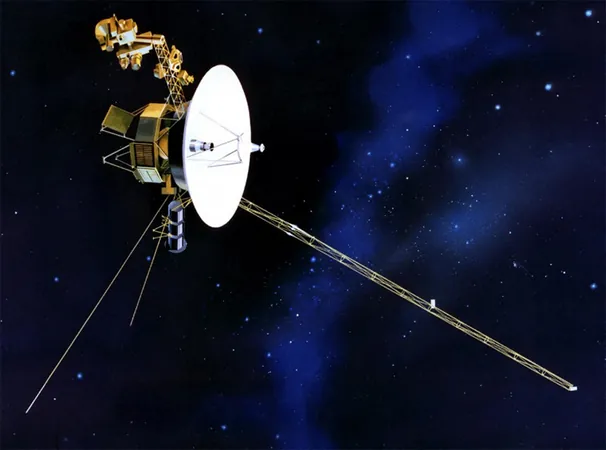
Space Race Heats Up: Musk Challenges NASA's Journey to Mars
2025-01-25
Author: John Tan
Introduction
This week has marked a significant milestone in the world of aerospace, highlighted by two major rocket launches that showcase the ongoing rivalry between industry giants Blue Origin and SpaceX. But amid these thrilling developments, a very public spat between Elon Musk and NASA over the future of Mars exploration reveals deeper tensions in the space race.
Blue Origin's New Glenn Launch
On January 16, Blue Origin made headlines with the long-awaited test flight of its heavy-lift rocket, New Glenn, from Cape Canaveral Space Force Station in Florida. After years of setbacks, this launch is a huge step for the company, highlighting New Glenn's capability to transport up to 45 tons into Earth's orbit or deliver payloads to other celestial bodies like the Moon and Mars.
What sets this rocket apart is its innovative design which uses liquid methane and oxygen as fuel, mirroring SpaceX's Starship. New Glenn's first stage is designed for reuse, landing vertically on a sea barge—an ambitious feat not yet attempted by SpaceX's Falcon Heavy.
Originally planned to carry NASA satellites to Mars in 2024, the inaugural flight was repurposed to test Blue Origin's satellite deployment system due to the postponement of mission timelines, allowing them to showcase their in-space maneuverability. Interestingly, New Glenn is also expected to deliver crewed lunar landers for NASA’s Artemis program, further entrenching the company in upcoming lunar and Martian projects.
SpaceX's Starship Test Flight
Meanwhile, across the ether, SpaceX conducted the seventh test flight of its Starship on the same day, attempting to demonstrate several upgrades including deploying dummy satellites for its Starlink internet service without generating space debris. The test flight, aiming for a controlled descent into the Indian Ocean, was crucial in advancing SpaceX’s plans for its reusable space travel system, vital for Musk's long-term vision of human colonization of Mars.
Debates Over Mars Exploration
As both companies gear up for future flights, the discussion of Mars exploration has ignited heated debate. NASA’s Artemis program intends to use lunar missions as a stepping stone for future Mars expeditions. This approach aims to develop crucial technologies for deep space missions.
However, Musk has publicly critiqued the Moon-focused strategy, arguing that it diverts resources away from more ambitious Mars missions. In recent tweets, he dismissed the Artemis program as inefficient and insisted that efforts should prioritize Mars instead.
Rift Between SpaceX and NASA
This stark divergence highlights a growing rift between SpaceX and NASA, with Musk positioning himself as a direct challenger to traditional space exploration pathways. Even as SpaceX wins major contracts and positions itself as a key player in lunar missions, Musk’s comments have raised questions about the future relationship between his company and NASA, especially given his association with politics influenced by President Trump.
NASA's Mars Sample Return Strategy
In another facet of the space exploration narrative, NASA has been reevaluating its Mars sample return strategy. After canceling plans for a costly joint mission with the European Space Agency, the agency is now looking for private partners to conduct the retrieval more efficiently.
Changes to the mission outline suggest that the rocket may indeed be smaller and potentially use the same landing techniques developed for the Perseverance rover.
International Developments
Internationally, China is also making strides in the space race. Their successful launch of the Shijian-25 satellite embarked on a mission to demonstrate in-orbit refueling technologies, which will potentially revolutionize satellite operations and extend their lifetimes.
Conclusion
As the quest for Mars continues, one thing is clear: the space race is more vibrant than ever, filled with ambition, innovation, and a growing set of players—civil, private, and international, challenging the boundaries of what humanity can achieve beyond Earth. Buckle up, because it’s only just beginning!



 Brasil (PT)
Brasil (PT)
 Canada (EN)
Canada (EN)
 Chile (ES)
Chile (ES)
 Česko (CS)
Česko (CS)
 대한민국 (KO)
대한민국 (KO)
 España (ES)
España (ES)
 France (FR)
France (FR)
 Hong Kong (EN)
Hong Kong (EN)
 Italia (IT)
Italia (IT)
 日本 (JA)
日本 (JA)
 Magyarország (HU)
Magyarország (HU)
 Norge (NO)
Norge (NO)
 Polska (PL)
Polska (PL)
 Schweiz (DE)
Schweiz (DE)
 Singapore (EN)
Singapore (EN)
 Sverige (SV)
Sverige (SV)
 Suomi (FI)
Suomi (FI)
 Türkiye (TR)
Türkiye (TR)
 الإمارات العربية المتحدة (AR)
الإمارات العربية المتحدة (AR)